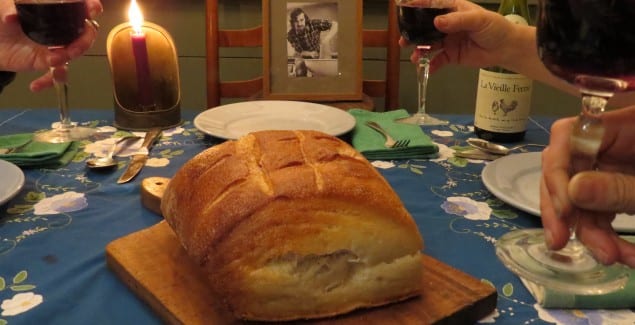Home For The Holidays: Facing Empty Chairs At The Table

Posted in: Hot Topics
Topics: Relationships
Here we are as in olden days,
Happy golden days of yore.
Faithful friends who are dear to us,
Gather near to us once more.
Through the years we all will be together,
If the fates allow…
From “Have Yourself A Merry Little Christmas”
***
Here we are in the holiday season. It’s inescapable.
The sounds of cheer, good spirits and happiness are all around us—on the television, in the best wishes from friends and colleagues, in the many cards we receive in the mail, in the sometimes-terribly-annoying music playing in virtually every store you march into, and, most importantly, at home.
We’ve all heard talk about the stress of the holidays, but there is a special kind of seasonal pain that is almost never discussed: the accentuated absences at family gatherings. We miss those who are no longer with us. And, that pain can be pretty intense at times. A child who has died, a grandparent who has departed…those wounds take time to heal. Must we, in the midst of this noticeable absence, still maintain our holiday cheer? The songs of the season don’t really give us instructions.
So, of course we feel sad. In fact, we can indulge such feelings as a kind of nostalgia. The term comes from two Greek words, nóstos, denoting homecoming, and álgos, meaning “ache.” Yet, the feeling of nostalgia is not necessarily painful; it is the sentimental feeling of missing the happiness of times gone by—a kind of longing for the loved ones we miss, and the times we spent with them.
It’s really a bunch of feelings, a happy-and-sad-emotional-jumbling.
And, this need not be a bad thing. It maintains our connection with the past. It reminds us of the bonds we feel for those who played an important role in our lives. In fact, we often replay in our minds the times we spent with those who are absent: a father’s jokes, a grandparent’s laugh, the pranks of a sibling.
It’s much like Luke Skywalker’s relationship with Obi-Wan Kenobi in the epic movie Star Wars. Obi-Wan has died, but it’s his memory and felt presence—the relationship he and Luke had—that fills Luke with hope, optimism, and perhaps most importantly, a sense that he is connected with nature. The Force is always with him. For Luke and for all of us, there is something about our being alive that transcends our current situation, and sparks nostalgic feelings.
And, these feelings can run the gamut of experience. Families change and move away. Kids grow up. Steve still recalls his mother’s muted tone when he explained to her the proposed schedule for Thanksgiving and the holidays for him and his wife. She understood. It went without saying that rituals would change, that old traditions would fade. Even if the end of every tradition is in essence the start of a new one, it doesn’t mean we don’t long for what’s lost.
In Gene’s family, when a candle is lit every Hanukkah, each family member takes a turn to remember a person (or even a pet) who has died. No tears are shed; just a light for someone still loved. It feels right. To Gene’s family, a generally secular family, it is, in fact, spiritually uplifting.
Think of your own family. How often do you look at old photos and home movies, or play the board games and puzzles you played with family and friends who are not around the table any longer?
And, here is where we have a real kind of holiday magic. When you think about those who are missing, those who are missing make their way back into the home. A cliché, we know—but so true. That’s one of the beauties in our circle of life. We never lose anyone; we are all home for the holidays.
Happy holidays, everyone!
A version of this post originally appeared and was written by the authors (Beresin and Schlozman) on WBUR’s CommonHealth.

 Share
Share Tweet
Tweet






